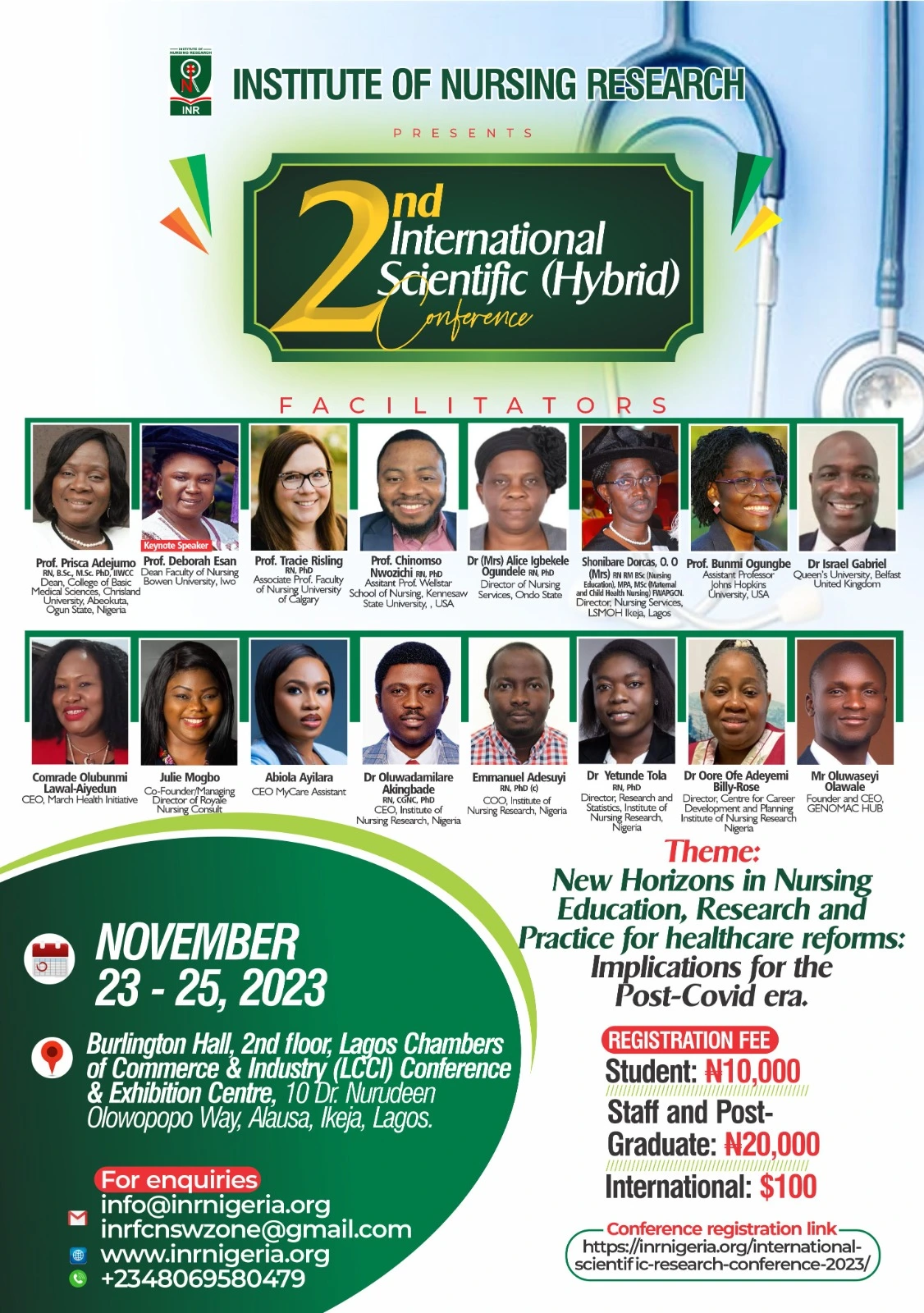A REPORT ON A PLENARY SESSION, “ADVANCES IN TELEHEALTH NURSING: RESEARCH AND EVIDENCE FOR HEALTHCARE” BY DR. CLAUDIA C. BARTZ OF THE INTERNATIONAL SOCIETY FOR eHEALTH AND TELEMEDICINE, HELD ON THE 17TH OF NOVEMBER, 2021, DURING THE INTERNATIONAL SCIENTIFIC RESEARCH CONFERENCE ORGANIZED BY THE INSTITUTE OF NURSING RESEARCH NIGERIA (INRN)
At exactly 05:30 pm (GMT+1), the moderator, Nurse Atoki Ruth welcomed all the participants and solicited a brief introduction from the attendees. About 70 participants started this plenary session.
After a brief discussion with the participants, at 05:45 pm (GMT+1), the moderator introduced the speaker, Dr. Claudia C. Bartz of the International Society for eHealth and Telemedicine, by reading a summary of her biography.
Dr. Claudia C. Bartz commenced this plenary session by sharing a little biography of herself. She started by saying she has been a professional registered nurse for over 50 years, which has been so amazing. Her clinical specialty was intensive/critical care – comfort with technology, and she has also spent a career in the US army where she was involved with Telehealth technology. She mentioned that she had worked for the International Council of Nurses for ten years and has been with the International Society for Telemedicine and eHealth for more than 10 years. During this period, there has been an increasing interest in telehealth and international health, which is mind-blowing. She went further saying that she is semi-retired as she continues to monitor telehealth nursing publications for application to practice.
In any of your publications, the fact that you are a nurse should be somewhere in your identification description
Dr. Claudia C. Bartz
She sparked off an interesting topic as she talked about the “When”, “Why”, and “How” of Telehealth nursing. She stated in her presentation that telehealth nursing began in the 1960s – 1970s when nurses realized that they could use telephones to deal and communicate with their patients or their care recipients.
From that period until now, technology has continued to progress, and it has opened a wide range of research opportunities and educational benefits, as we can widely see the use of simulators in nursing education today.
She talked about the advancement of technology over the past decades, and in the 2020s, she said we should “Watch this space!” as there will be greater advancement in telehealth nursing. She also pointed out the number of telehealth publications we have had so far, and how these numbers are increasing rapidly over the years.
Dr. Bartz elaborated on the lessons learned from several years of reviewing works of literature on telehealth nursing. Describing how she collaborated with a librarian, who regularly reviews journals’ tables of content for telehealth and telenursing publications, and later sends everything she finds to her. They believe this constant approach to literature searches enables them to identify current telehealth, telenursing, and digital health publications more effectively.
As an undergraduate nurse, replicating studies is a good consideration, for it enhances greater assurance of the significance of the findings while factoring in the difference between samples and settings
Dr. Claudia C. Bartz
She went ahead to say that she reviews up to 60 papers every month; papers with nurses as the first author, intervention research designs, and systematic reviews, with or without meta-analyses. Here, she emphasized this statement, “In any of your publications, the fact that you are a nurse should be somewhere in your identification description.”
She gave us some insight into the types of research being carried out. She made mention of Qualitative Research; Descriptive Research; Quasi-experimental Research; and Experimental Research. Where she pointed out that Quasi-experimental research is the most of nursing research, where you compare the phenomena, using interventions.
Dr. Bartz indicated the importance of intervention research findings as it is a source of evidence for nursing practice. She said, “When intervention researches are done, you see by reading that the author(s) have often completed preliminary work (qualitative, descriptive), so it strengthens your understanding of what it is they are doing, and how they do it.”
She dived into the phenomenon of Systematic review, saying it is the process where the researcher assembles as many papers as possible on the topic using a variety of different sources, such as Pubmed, Research Gate, etc., showing the importance of the topic. Systematic reviews use a structured analysis process with larger data sets, for example, PRISMA, but the limitation of these studies is that they are often difficult to compare. It entails different samples, settings, application of interventions, details of analyses, variations in findings, and conclusions. All these shortcomings challenge the reliability and the validity of meta-analyses.
Science is not a static entity- it is dynamic
Dr. Claudia C. Bartz
She talked about her recent discoveries in telehealth nursing research, and how these intervention research papers were sorted out “by country” and “by design”. Countries include Brazil, China, South Korea, Spain, Taiwan, Thailand, Turkey, and the USA. By design: Randomized, Systematic review, Systematic review, and meta-analysis, Integrative review, Scoping review, Quasi-experimental, and Comparison of the interventions.
She emphasized the need for nurses to get involved in intervention research. She said that Nurse-led research puts nursing science and art at the forefront. Intervention research studies encourage further research and provide more evidence for practice. She went ahead to make a list of challenges faced during this study:
– Nurse-led research is best done with a committed team;
– Time is a precious commodity;
– Research with human subjects is very challenging due to subject acquisition, the need to control intervention variables, the numerous uncontrolled variables, and many different kinds of people who will make up the study sample.
Her core messages to nurses were “As nurses, we expect a great deal of ourselves and others; so also do our colleagues and care recipients expect a great deal of us.” She went further to say, No matter where you are, no matter what you are doing, YOU ARE A NURSE; that is your identity!
She advocated that while starting evidence-based research, Start small! “You are not going to solve all the problems of nursing in one research study all at a time,” she said. She also advised that young nurses should work in a team, and look for experienced and qualified mentors.
Dr. Bartz brought attention to the fact that nurses need to be involved in science and research. ‘Science is not a static entity – it is dynamic’ she said. Applying “the science” means constant assessment of current practice and evidence and the commitment to changing practice based on research. She concluded her presentation with these questions for the future:
Nurses learn about research in their education programs. Can more nurses be encouraged to lead research studies and to publish them, especially at the post-baccalaureate level?
A limitation of mine is that all papers are in English. Could nurses of the other countries/languages be scanning the literature for nurse-led research?
The continuing challenges of COVID have probably decreased nurse-led research. What are the possibilities for greater research collaboration?


Leave a Reply